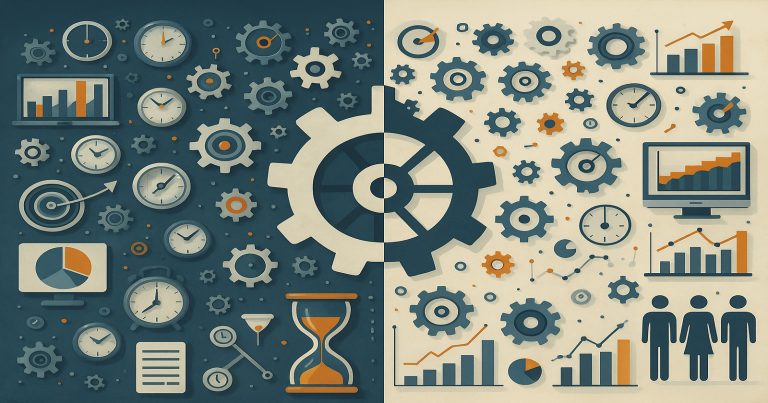Personal or professional life requires knowing the difference between efficiency and effectiveness. Efficiency uses fewer resources for more output, while effectiveness means achieving the proper outcomes. Though they sound similar, these concepts play different but equally essential roles in improving productivity, success, and impact across various areas. Knowing how to apply both ensures that people and organizations work harder, smarter, and with purpose.
What is Efficiency?
Efficiency is doing a task best using the least time, money, or effort. It ensures that processes are smooth, organized, and cost-effective.
Key Features of Efficiency
Efficiency focuses on “how” the work is done rather than “why” it’s done. This is where the difference between efficiency and effectiveness in management becomes evident.
Core Elements of Efficiency
- Resource Optimization: Uses minimal time, money, and workforce to get results.
- Process-Oriented: Focuses on doing things the right way, faster and cheaper.
- Quantitative Measurement: Measured using time saved, money spent, labor used, etc.
- Cost Reduction: Reduces expenses and enhances competitiveness.
- Time Management: Ensures faster completion of tasks.
- Sustainability: Reduces waste and supports green practices.
Example of Efficiency
A factory that uses automation to produce 1,000 units in 400 hours with minimal errors shows efficiency. It completes more work in less time and with fewer resources.
What is Effectiveness?
Effectiveness is about achieving the right goals. It means doing the right thing, even if it takes more resources. This quality ensures that actions solve the problems they are intended to solve.
Key Features of Effectiveness
Effectiveness appears at the end of the results road, where you can see if the result is what you wanted. That critical factor usually comes into play when separating efficiency from effectiveness in business.
Basic Components of Effectiveness
- Goal-Oriented: Aim for meaningful and desirable ends.
- Outcome-Based: How effective the goal can be is more important than how it will be made to work.
- Qualitative Measurement: Evaluating the extent of goal accomplishments.
- Customer Satisfaction: Better customer service leads to customer loyalty.
- Impact Driven: Results may not be immediate; it invests in long-term success and significant transformation.
Example of Effectiveness
A company spends tons on its advertising campaign. If it comes to the planned outcome- increased awareness of sales- it may be effective even if inefficient.
Difference Between Efficiency and Effectiveness
Though often used interchangeably, efficiency and effectiveness are not the same. Both are critical in achieving performance and success, but serve different purposes. The difference between efficiency and effectiveness lies mainly in their focus, measurement, and outcome orientation.
- Efficiency is doing things as best as possible, with minimal waste of time, effort, and resources. It improves speed and reduces costs.
- Conversely, effectiveness is about doing the right tasks to achieve the desired results, even if it takes more time or resources.
Knowing this difference in personal life, business, and especially management helps individuals and teams prioritize and achieve performance and purpose.
| Feature | Efficiency | Effectiveness |
| Focus | Process and use of resources. | Outcomes and goal achievement |
| Objective | Maximize output with fewer inputs. | Achieve the correct or intended goal |
| Measurement Type | Quantitative (time, cost, effort). | Qualitative (success rate, satisfaction). |
| Time Orientation | Short-term improvements and gains. | Long-term success and sustainability. |
| Impact | Resource saving and faster results. | Problem-solving and meaningful improvements. |
| Approach | Doing things right. | Doing the right things. |
| Result Type | Efficient use of inputs. | Effective fulfillment of purpose. |
Advantage of Efficiency
One of the things that efficiency tends to produce is an output boost without inviting any extra efforts. An efficient person saves resources and gets more results in competitive fields like business or education.
- Cost: Saving waste creates an avenue for cost savings.
- Productivity: More is achieved in less time. Use resources responsibly.
- Rapid Reaction: Helps corporations respond promptly to ever-changing markets.
For example,
Using route-planning software allows your couriers to minimize fuel usage and delivery time for their various packages. The efficiency that results from it is transformed into savings and customer satisfaction.
Advantages of Effectiveness
Effectiveness makes certain that what is done is achieved. It can be a very energy-greedy process, like a slow cooker, but the result is long-term viability.
- Goal Fulfills Success: Guarantees that the strategic purpose is followed through successfully.
- Better Decisions: This inspires thoughtful considerations of choices and their effects.
- Reputation: Trust is built when the objectives are met and maintained.
- Customer Loyalty: Those satisfied tend to revisit and have good things to say.
Example:
A school runs a campaign to encourage dropout students to return. Even if expensive, the program works and brings back many students—hence, it is effective.
Difference Between Efficiency and Effectiveness FAQs
1. What is the difference between efficiency and effectiveness?
Efficiency is about using fewer resources. Effectiveness is about reaching the right goal. One focuses on the process, the other on the outcome.
2. Can an organization be efficient but not effective?
Yes, if it does the wrong things quickly. For example, producing the wrong product efficiently still leads to failure.
3. What is the difference between efficiency and effectiveness in management?
In management, efficiency means using team resources well. Effectiveness means setting and achieving the correct business goals.
4. What is the difference between efficiency and effectiveness in business?
In business, efficiency means cheaper and faster operations. Effectiveness means successful marketing, satisfied customers, and meeting targets.
5. Which is more critical—efficiency or effectiveness?
Both matter. However, effectiveness is more important because even efficient actions mean nothing if they don’t lead to the proper outcomes.


